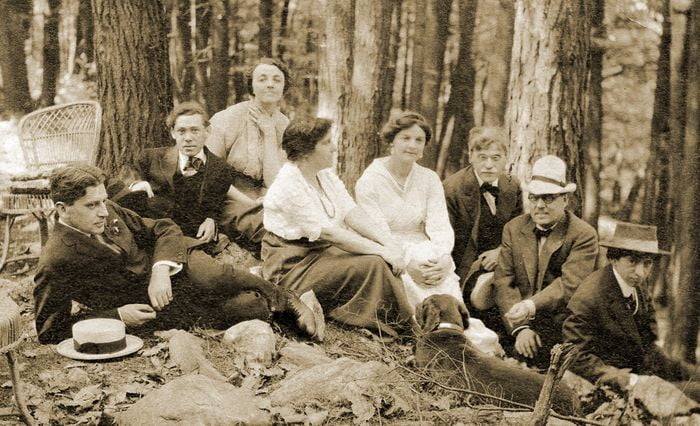Moonlight and shadows combined to give it a strange form and a stranger reality, this fluttering of bog-fire or dancing of wandering fireflies. Was it truly his lost Phoebe? By a circuitous route it passed about him, and in his fevered state he fancied that he could see the very eyes of her, not as she was when he last saw her in the black dress and shawl but now a strangely younger Phoebe, gayer, sweeter, the one whom he had known years before as a girl. Old Reifsneider got up. He had been expecting and dreaming of this hour all these years, and now as he saw the feeble light dancing lightly before him he peered at it questioningly, one thin hand in his gray hair.
Graceful movements
Of a sudden there came to him now for the first time in many years the full charm of her girlish figure as he had known it in boyhood, the pleasing, sympathetic smile, the brown hair, the blue sash she had once worn about her waist at a picnic, her gay, graceful movements. He walked around the base of the tree, straining with his eyes, forgetting for once his cane and utensils, and following eagerly after. On she moved before him, a will-o`-the-wisp of the spring, a little flame above her head, and it seemed as though among the small saplings of ash and beech and the thick trunks of hickory and elm that she signaled with a young, a lightsome hand.
“O Phoebe! Phoebe!” he called. “Have yuh really come? Have yuh really answered me?” And hurrying faster, he fell once, scrambling lamely to his feet, only to see the light in the distance dancing illusively on. In and on he hurried until he was fairly running, brushing his ragged arms against the trees, striking his hands and face against impending twigs. His hat was gone, his lungs were breathless, his reason quite astray, when coming to the edge of the cliff he saw her below among a silvery bed of apple-trees now blooming in the spring.
“O Phoebe!” he called. “O Phoebe! Oh, no, don`t leave me!” And feeling the lure of a world where love was young and Phoebe as this vision presented her, a delightful epitome of their quondam youth, he gave a gay cry of “Oh, wait, Phoebe!” and leaped.
Some farmer-boys, reconnoitering this region of bounty and prospect some few days afterward, found first the tin utensils tied together under the tree where he had left them, and then later at the foot of the cliff, pale, broken, but elate, a molded smile of peace and delight upon his lips, his body. His old hat was discovered lying under some low- growing saplings the twigs of which had held it back. No one of all the simple population knew how eagerly and joyously he had found his lost mate.
Read More about Ibn Battuta part 62








